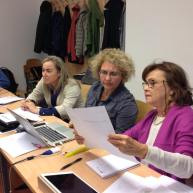The fifth meeting of the CITA project was held in Budapest at Eötvös Loránd University from 25 to 27 October. All 12 members of the CITA partnership attended. The meeting began with the consideration of the external evaluator’s, Neus Lorenzo’s, report. There were a number of specific recommendations in the report, the most important  of which was the need to refer more to European values in the project outcomes. The report noted that the quality of cooperation between the three associations was positive an efficient and concluded that the project would have a substantial positive impact.
of which was the need to refer more to European values in the project outcomes. The report noted that the quality of cooperation between the three associations was positive an efficient and concluded that the project would have a substantial positive impact.
The meeting continued with an update from the previous meeting in Vilnius, noting new activities that had been implemented by each association from the practice of one of the other associations. We also discussed ideas for sharing expertise on management and administration and drew up a list of good practices that we could share and include in the guidelines. This included the idea of compiling an archive of document templates that were used by each association and might be useful for other associations.
This included the idea of compiling an archive of document templates that were used by each association and might be useful for other associations.
Next came an evaluation of the five-day CLIL course that was held in Lithuania from 29 June to 3 July, 2015. Each association gave a brief summary from the feedback from the participants from their country. The benefits and points which could be improved were focused on and the overall conclusion was that the course had been extremely successful, particularly in allowing teachers to work together and learn from each other. It was decided that a report would be written with the aim of identifying the keys to success of an international course.
The first part of the job shadowing activities were also evaluated and the arrangements for the next job shadowing in Palma were discussed. Finally, the preparation for the next transnational meeting in Lithuania and the preparations for the dissemination conference in Palma at the end of the project were also discussed. Communication of the activities and outcomes of the project was also lo oked at, as well as the details of the publication of the “CITA Guidelines” to be published during the final conference. A timeline revision of the CITA Workplan was made.
oked at, as well as the details of the publication of the “CITA Guidelines” to be published during the final conference. A timeline revision of the CITA Workplan was made.
The last points to be covered in the meeting were an update on the last minute preparations for the English Teacher Profile course, which was being held concurrently with the meeting in Budapest, and an evaluation of the needs analysis questionnaires which had been administered earlier by each association (CLIL Teachers Questionnaire and the Novice Teachers Questionnaire), looking at the overall trends from each questionnaire.

